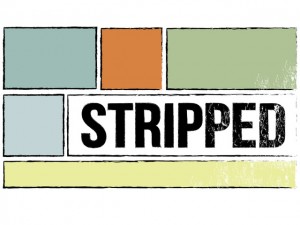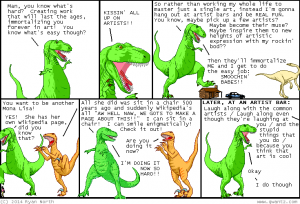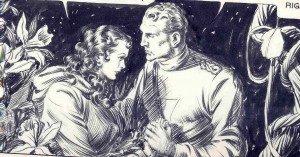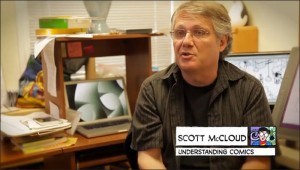The new documentary STRIPPED is about a lot of things — the art and history of the newspaper comic strip, tradition versus technology, that poster you’ve no doubt heard about, featuring the first published artwork from Calvin and Hobbes creator Bill Watterson in umpteen years — but the fundamental question at the heart of the film is this: in a landscape where the newspaper is seemingly into the death rattle, what becomes of the comic strip?
Popdose caught up with the movie’s creators, Dave Kellett and Frederick Schroeder, to discuss the film, it’s subject, and why the future isn’t as bleak for the daily strip as one might assume.
 Popdose: What was the impetus for doing this documentary? Was there a particular story or moment that caused you to look deeper into the world of comic strips and the decay of the daily newspaper?
Popdose: What was the impetus for doing this documentary? Was there a particular story or moment that caused you to look deeper into the world of comic strips and the decay of the daily newspaper?
Frederick Schroeder: Originally I approached Dave to make a documentary about different artists studio spaces and he came back and pitched me the idea of just focusing on cartoonists and comic strips. We both came to the conclusion that nothing like this had been done before and would love to see a movie that delved into the subject. When we started the movie, over four years ago newspapers had taken their hardest hit in decades so it really felt like there was a time limit on how much time was left for the funny pages. When the Rocky Mountain News closed in 2009 I think we both felt that newspapers were fading fast into the sunset but newspapers have proved more resilient in recent years and the more successful ones have really moved into the digital sphere quite well.
Dave Kellett: But the driving force, for both us, over the four years of production, was to make the movie we wished existed in the world. No one had ever taken a serious, heartfelt look at comic strips before — especially taking a serious tone with the artists themselves. So the passion for it was grounded in a passion for comic strips.
 Popdose: The “funny pages” have been in a state of concern for decades. As far back as the 1970s, comic strip artists were dealing with print space becoming smaller and smaller. In your interviews, are the artists who are farther along in the industry taking the migration to online harder than newer generations, or do they see this as more entropy?
Popdose: The “funny pages” have been in a state of concern for decades. As far back as the 1970s, comic strip artists were dealing with print space becoming smaller and smaller. In your interviews, are the artists who are farther along in the industry taking the migration to online harder than newer generations, or do they see this as more entropy?
Frederick Schroeder: Cartooning is such an interesting career because it is something you can do for your whole life. Many cartoonists work for 50 or 60 years straight! Anytime you get used to doing something a certain way there is going to be a certain resistance to change or a sense that one has seen it all and all things pass. Many of the oldest generation of cartoonists have no interest in moving online even if their syndicates do. However the vast majority of cartoonists we talked to are extremely interested in the web and the possibilities it brings both artistically and commercially.
Dave Kellett: I’d say that’s a perfect summation. Because really, if you’re 75, and at the top of your game, what incentive or drive do you feel to reinvent the wheel for your comic, and get is running on a slick HTML 5 site with every possible social media around it? But for anyone, say, 45 or younger, we’ve seen incredible interest in making the switch.
Popdose: In your interviews, what struck you as the the most surprising aspect of the comic strip medium or of the next generation who see it as online content first and foremost?
 Frederick Schroeder: One of the most surprising things that stuck me while interviewing a lot of the younger cartoonists is how many discovered comics without the funny papers. Many of the artists creating the most innovative things online came to comics through the web to begin with. I think strips like Dinosaur Comics, XKCD, Questionable Content and PVP have brought in a whole slew of creators who would never thought to make strips if they had grown up reading the traditional comics page.
Frederick Schroeder: One of the most surprising things that stuck me while interviewing a lot of the younger cartoonists is how many discovered comics without the funny papers. Many of the artists creating the most innovative things online came to comics through the web to begin with. I think strips like Dinosaur Comics, XKCD, Questionable Content and PVP have brought in a whole slew of creators who would never thought to make strips if they had grown up reading the traditional comics page.
Popdose: Online comics can become very popular and can amass a large fan base, but can they achieve the ubiquity a newspaper strip once carried? In other words, can we have characters as well-known as Peanuts in the crowded Internet world?
Dave Kellett: No, the days of the comic strip that everyone knows and reads are dead. Like every other art form, we’re living in a increasingly atomised media landscape.
 Frederick Schroeder: I’m not sure if we’ll ever have a comic as popular and ubiquitous as Peanuts or Garfield ever again. While the web offers enormous opportunity for a wide range of content and access it also narrowcasts to a more specific audience. This specific audience may be huge in an of itself (for example video gamers) but it will be rare (not impossible) for the comic servicing them to reach people outside of that specific demographic the way newspaper comics could back when 90% of the country read the paper.
Frederick Schroeder: I’m not sure if we’ll ever have a comic as popular and ubiquitous as Peanuts or Garfield ever again. While the web offers enormous opportunity for a wide range of content and access it also narrowcasts to a more specific audience. This specific audience may be huge in an of itself (for example video gamers) but it will be rare (not impossible) for the comic servicing them to reach people outside of that specific demographic the way newspaper comics could back when 90% of the country read the paper.
Popdose: Stripped was partially crowdfunded. What was your experience with that process?
Frederick Schroeder: Kickstarter was an amazing opportunity for us and STRIPPED. Without our Kickstarter backers we could not have made the same movie with its size and scope. The fact that we had over 5000 backers also meant we not only had financial support but had an amazing resource of fans who could help us with all kinds of things: for example we were looking for specific strips to use in the movie and they were extremely helpful in pointing us in the right direction to find them.
 Dave Kellett: It was a wonderful thing to make a film without having to take a single note from any producer, studio, or distributor. We had absolute final cut — and show me the film-maker from 20 years ago that could’ve said that.
Dave Kellett: It was a wonderful thing to make a film without having to take a single note from any producer, studio, or distributor. We had absolute final cut — and show me the film-maker from 20 years ago that could’ve said that.
Popdose: Is crowdfunding the future of independent work, or do you see it as a bridge to a different business model?
Frederick Schroeder: I really believe that crowdfunding is the future for independent moviemakers. If you have an idea and people want to see it, there’s no reason you can’t get it made with their help. That is an extraordinary opportunity for creative people! There is no longer any gatekeeper between you and your audience. You can go directly to them and make something with complete creative freedom … Of course webcartoonists have been doing this for years.
Dave Kellett: It’s definitely here to stay. Because there’s a crowd-vetted aspect to the artist and the project: If either one seems skeevy or untrustworthy or just plain bad, then the project doesn’t go forward.
 Popdose: How is STRIPPED being distributed?
Popdose: How is STRIPPED being distributed?
Frederick Schroeder: STRIPPED is being self-distributed by Dave and myself. We are launching it online through iTunes on April 1st (but you can pre-order it here: https://itunes.apple.com/us/movie/stripped/id816065098?ls=1) after that it will be available through GooglePlay and of course through our site www.strippedfilm.com (via VHX.tv) as a DRM-free download or DVD. We’re also planning a 10 city tour hopefully with a lot of the cartoonists we interviewed joining us for Q/A after the film because the movie really sparks interesting discussions not just about comics but about the future of art and being a creative person in the 21st century. In addition to the movie we are also making many of the interviews available in uncut form on our site for fans who really want to explore the conversation further.
Dave Kellett: It’s kind of an extension of how we made the film: No middle-men, no one telling us we have to do this or that. It’s lovely, freeing, and incredibly empowering.
Popdose: What are your personal feelings about or toward comic strips? Were you a fan and followed the medium, or were you intrigued by the business aspect of this story, the cause and effect: can there be “newspaper funnies” without newspapers?
Dave Kellett: I’m a professional cartoonist myself, so this has been a lifelong love-affair and fascination with an art form that I think has been largely undervalued by “high” art and by media critics. So even though our focal point is on this specific moment in comics, it’s also about this hundred-year old newspaper art form that’s influenced generations of novelists, presidents, business leaders, and cultural thought.
 Frederick Schroeder: I’ve been a life-long fan of the comic strips, everything from Calvin & Hobbes and Garfield to Prince Valiant and Steve Canyon I devoured voraciously from my earliest years as a child. In large part STRIPPED is a love letter to this long neglected medium of the comic strip. However, being a creative person myself, STRIPPED also allowed me the opportunity to use comics as a unique medium to examine the shift into the digital realm that has taken place with so many other art forms from music to film.
Frederick Schroeder: I’ve been a life-long fan of the comic strips, everything from Calvin & Hobbes and Garfield to Prince Valiant and Steve Canyon I devoured voraciously from my earliest years as a child. In large part STRIPPED is a love letter to this long neglected medium of the comic strip. However, being a creative person myself, STRIPPED also allowed me the opportunity to use comics as a unique medium to examine the shift into the digital realm that has taken place with so many other art forms from music to film.
Popdose: I’m a fan, myself. I loved Peanuts, Bloom County, Calvin & Hobbes, and several others. However, I also loved the adventure strips with detailed art (thinking of Alex Raymond Flash Gordon, Al Williamson’s work on the Star Wars strip, even the early The Spirit by Will Eisner, although those were comic books distributed in newspapers). Does the new paradigm afford a return to adventure strips, or have we come to see the “funnies” as a specific thing, and that specificity will migrate to the new delivery system?
Frederick Schroeder: What is truly great about the internet (and webcomics) is that it allows for whatever you want to do creatively. The space you are taking up with your comics is virtual and therefore infinite when compared to the newspaper page. That means your panels can be as large or as small as you want and your stories can be as elaborate or intimate as you can imagine. No subject is taboo or off limits and no genre is out of bounds. As Dylan Meconis (the artist behind the webcomic Family Man) says in our film ”as long as you pay for the webhosting fees you can do whatever you want.”
Dave Kellett: And you see that result, in what’s being produced. You have long form and short form comic strips again. You have adventures, sci-fi, fantasy, narrator-driven and character driven. The comic strip page had been reduced to telling stories with white kids and animals — just a few keys on the piano. And now they have the full piano again, and you’re seeing an explosion of new voices, characters, styles, and genres in comics. There’s almost never been a better time to read comics. It’s exciting, and I think the film tries to capture some of that excitement.





Comments